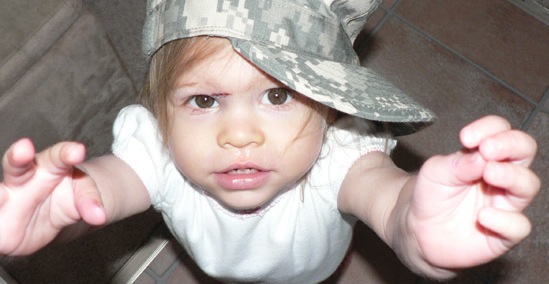
The Gift of Weakness
I love the story of Gideon, a man filled with insecurity and doubt, who delivers his people from an exceedingly strong enemy by the empowerment and direction of God. In case the story is new to you, here is a brief synopsis: Israel turned away from God to follow the idols of the Amorites, and so God removed his protection over them. They were oppressed for seven years by the Midianites who destroyed their livestock and crops; Judges 6:5 says that the Midianite tents were as numerous as a swarm of locusts. The Israelites were so oppressed by them that they subsisted in caves, mountain clefts, any hiding places they could find.
Finally, they cried out to God for deliverance, and God sent the angel of the Lord to Gideon, the weakest and least significant member of his clan. I love that. It is a great comfort to me that God has a different set of criteria than our culture for choosing a person to carry out his will. We naturally gravitate to those with beauty, strength, intelligence, charisma, wealth, popularity, but God chooses ones from among the overlooked and rejected, and he makes them great. In 1 Samuel 2:8-9, Hannah declares, “He raises the poor from the dust and lifts the needy from the ash heap; he seats them with princes and has them inherit a throne of honor.” In Luke 1:53, Mary says, “He has filled the hungry with good things but has sent the rich away empty.”
God’s Graciousness
Is it surprising to you that one of God’s greatest desires for you is that you simply and freely be yourself? No more, no less. So what does this have to do with our life of prayer? God shows us through his response to Gideon that:
- He is gracious and patient with us when we are needy and afraid.
- When he has revealed his will for us, he works with us to fulfill it, and he is faithful to complete it.
Gideon was honest about his need and asked earnestly three times for confirmation of God’s will. Each time God answered him without delay. Then God went even further in his reassurance of Gideon. When it came time for Gideon and his men to attack the enemy, God said, “If you are afraid to attack, go down to the camp with your servant Purah and listen to what they are saying. Afterward, you will be encouraged to attack the camp.”
In Judges 7:10-11a, Gideon goes to the camp, hears through the telling of a dream and its interpretation that the Midianites will be given into his hands. He is then filled with courage and confronts the enemy. As Gideon obeyed, God “caused the men throughout the camp to turn on each other with their swords.” In their terror and confusion, they were overcome by the Israelites. At no point could Gideon and his men have won the victory by their own strength, which is exactly how God wanted it.
Trust and Dependency
As you give yourself entirely to God, your weaknesses become your greatest strengths. Gideon’s surpassing weakness lead to his trust and dependency on God who became his strength and power (Hebrews 11:34b). There are many things we and those we love face in this life that could cause us to hide “in caves and in mountain clefts”. But God promises to be strong in our weakness (with potentially spectacular results), as we look to him with trust and faith.
Laura, thanks for sharing. Kris Vallotton just posted on his Facebook page a similar thought. Here it is:
“I find myself struggling with feelings of inadequacy in big moments …the sense I don’t measure up to the task or that I have nothing meaningful to say. Sometimes the greater expectation that is put on me the more the feelings increase.
I do my best to remember that God uses weak people, that He only needs a yielded heart, and that my job is to be faithful and do my best…His job is to touch people as He sees fit. Working for and with Him really helps in these storms.”
That’s a wonderful quote, Kevin! Kris is a perfect example of one who lives in dependence on God.